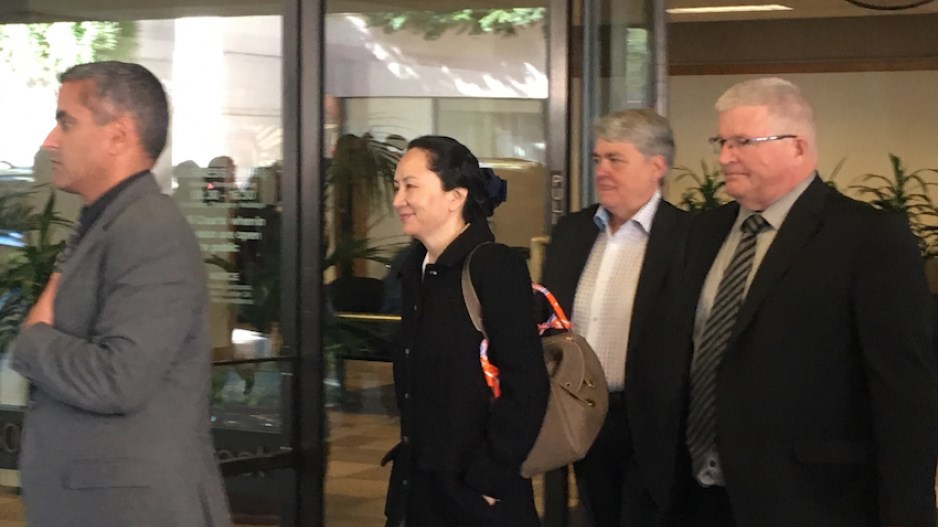One of the border officers who questioned Huawei Technologies Co. Ltd. CFO Meng Wanzhou before her arrest said officials had to carry out a secondary inspection lasting almost three hours because they had concerns about admitting the Chinese executive into Canada, the court heard today.
The hearings on the Meng extradition affair continued on Wednesday with the questioning of a second witness, CBSA officer Scott Kirkland, who dispelled a number of misconceptions about the border service's role in criminal matters and conducting secondary inspections – such as the one Meng was undergoing for three hours prior to being arrested.
Under the questioning of Crown lawyer Diba Mazjub, Kirkland told the court that secondary inspections at the border are by their nature different than criminal arrests - and the bar required to be cleared to do routine procedures such as gathering electronic devices is much lower than that in a criminal arrest.
"We should give a reason for needing to take their electronic devices," Kirkland said of cases that required such a move. "But it's a low bar. The person [being inspected] would not get legal counsel."
Kirkland later noted that he did jot down passcodes given by Meng for his own use for the border admissibility check, but the paper containing the information was mistakenly transferred to the RCMP when police took Meng into custody. Kirkland added that he did not create the paper with the codes for police use – and would have stopped RCMP officers from leaving with the information had he known the paper was mistakenly included in Meng’s belongings seized by the police after arrest.
Meng was arrested at YVR by police after CBSA conducted its border entry check, and Kirkland was adamant that the two agencies – while at the same location – had almost zero coordination.
“It was very much like, ‘You do what you have to do, and we do what we have to do,’” he said, adding that the CBSA arrived at the need to conduct the three-hour inspection independently due to Huawei’s appearances in the news in getting banned to sell products in the United States as well as facing 5G bans in Australia, thus creating espionage and national security concerns for allowing Meng to enter Canada.
And, Kirkland added, Meng was intending to enter Canada and not merely connect through the airport. He noted there was a driver waiting for Meng outside the airport, adding that the Huawei executive also had household goods with her that she wanted to move to one of her Vancouver homes.
“I had charter concerns,” Kirkland said of the procedure to conduct a secondary inspection before letting the RCMP serve the arrest warrant and notifying Meng of her rights. “But we still had a job to do [on admissibility]. The expectation of privacy is lower at a port of entry, and this is a port of entry.... That’s why police typically do not operate in a port of entry.”
Kirkland also noted that - while CBSA agents may be authorized to serve warrants - that power does not extend to warrants in extradition cases because it was not one of the categories delegated to border agents under the law. Conducting arrests on an aircraft or directly at the gate, he added, was exceedingly rare and usually reserved for serious incidents that happened on the plane (such as one passenger assaulting another during the flight).
Lawyers this morning completed the cross-examination of the RCMP officer who arrested Huawei Technologies Co. Ltd. CFO Meng Wanzhou, with Const. Winston Yep and defence attorney Richard Peck butting heads at times after two days of contentious questioning.
The morning cross-examination focused on Peck’s criticism of Yep for not taking detailed notes of both the Dec. 1 arrest process and the lead-up meetings on that day and on Nov. 30 in preparation for the arrest. But it was during the early part of the questioning when Peck challenged the RCMP’s change of plans – from arresting Meng on the plane or at the gate to waiting until after CBSA detention – which the defence lawyer deemed untruthful in the reasons provided for the change.
“I accept that this is your answer,” Peck said to Yep during cross-examination about the plan change, which Yep attributed to public safety concerns for making an arrest while in the presence of other passengers. “It is my suggestion that the public safety reason is a dishonest answer.”
Peck noted items such as Meng’s lack of a violent criminal record, the fact that she passed through security at Hong Kong International Airport, and the reality that she was not travelling with any bodyguards as reasons why public safety was never at risk – to which Yep pushed back.
“There were other people there,” Yep said, reiterating the RCMP cannot take any chances or make assumptions about the possible harm a desperate suspect can cause.
Peck, in focusing his criticism on Yep’s lack of detail notes of the days’ events, said the officer should have remembered training that emphasized the importance of taking detailed records – in case it is needed to assist in the prosecution of a case such as the Meng affair. To that, Yep agreed that he did not take the detailed notes as his training emphasized.
Peck also criticized the RCMP officers for delaying the arrest, calling it a violation of the court order for immediate arrest of Meng in 2018. Again, Yep responded by saying the three-hour questioning by the Canada Border Services Agency was “reasonable” in its length and did not constitute a violation to the order in his opinion.
Crown lawyer John Gibb-Carsley completed the questioning by redirecting the witness, putting the emphasis on the lack of a conspiracy or undue coordination with U.S. authorities in arresting Meng.
“Do you answer to the FBI?” Gibb-Carley asked.
“No,” Yep responded.
Meng’s defence team will launch its cross-examination of Kirkland on Thursday.




